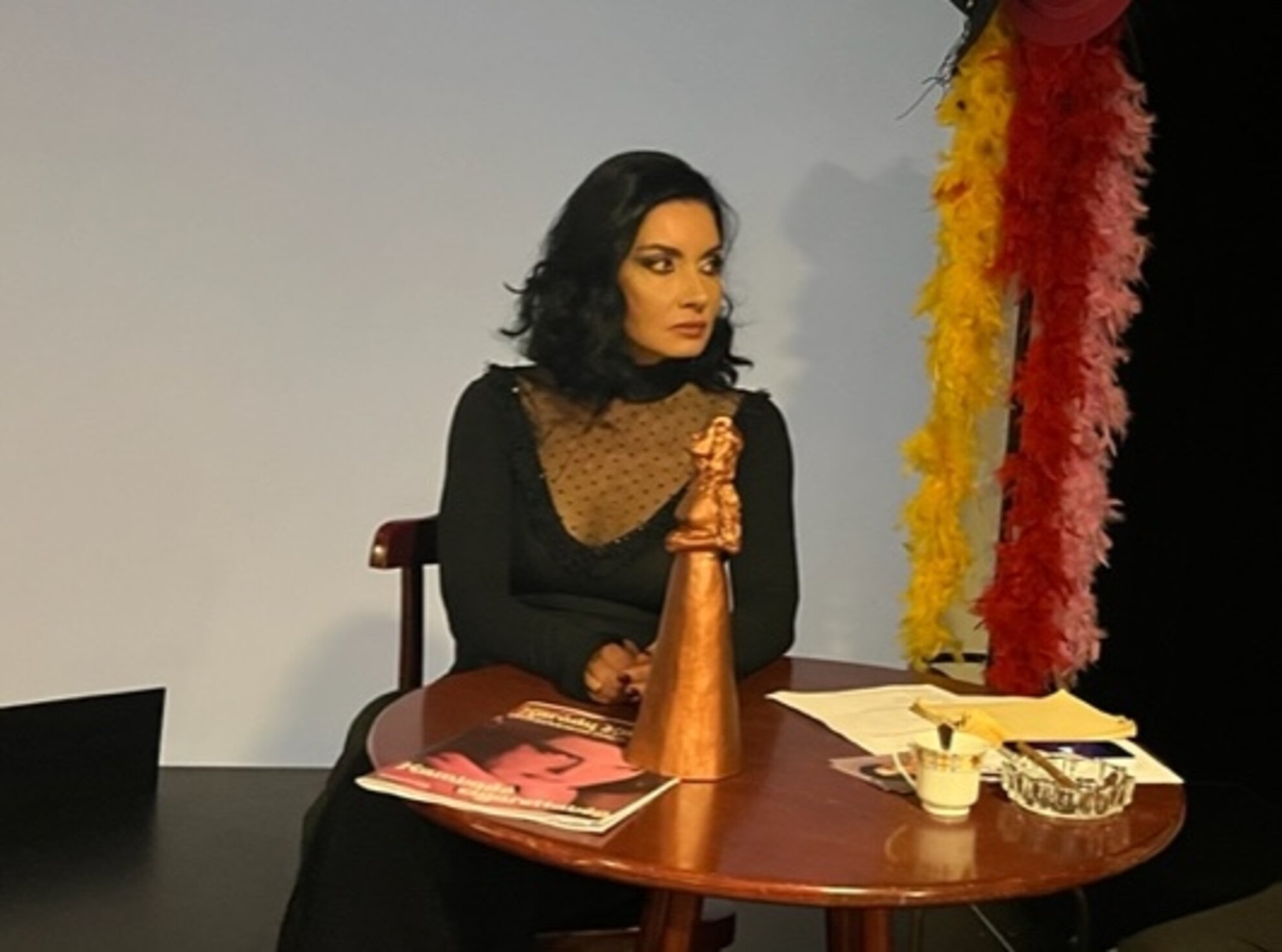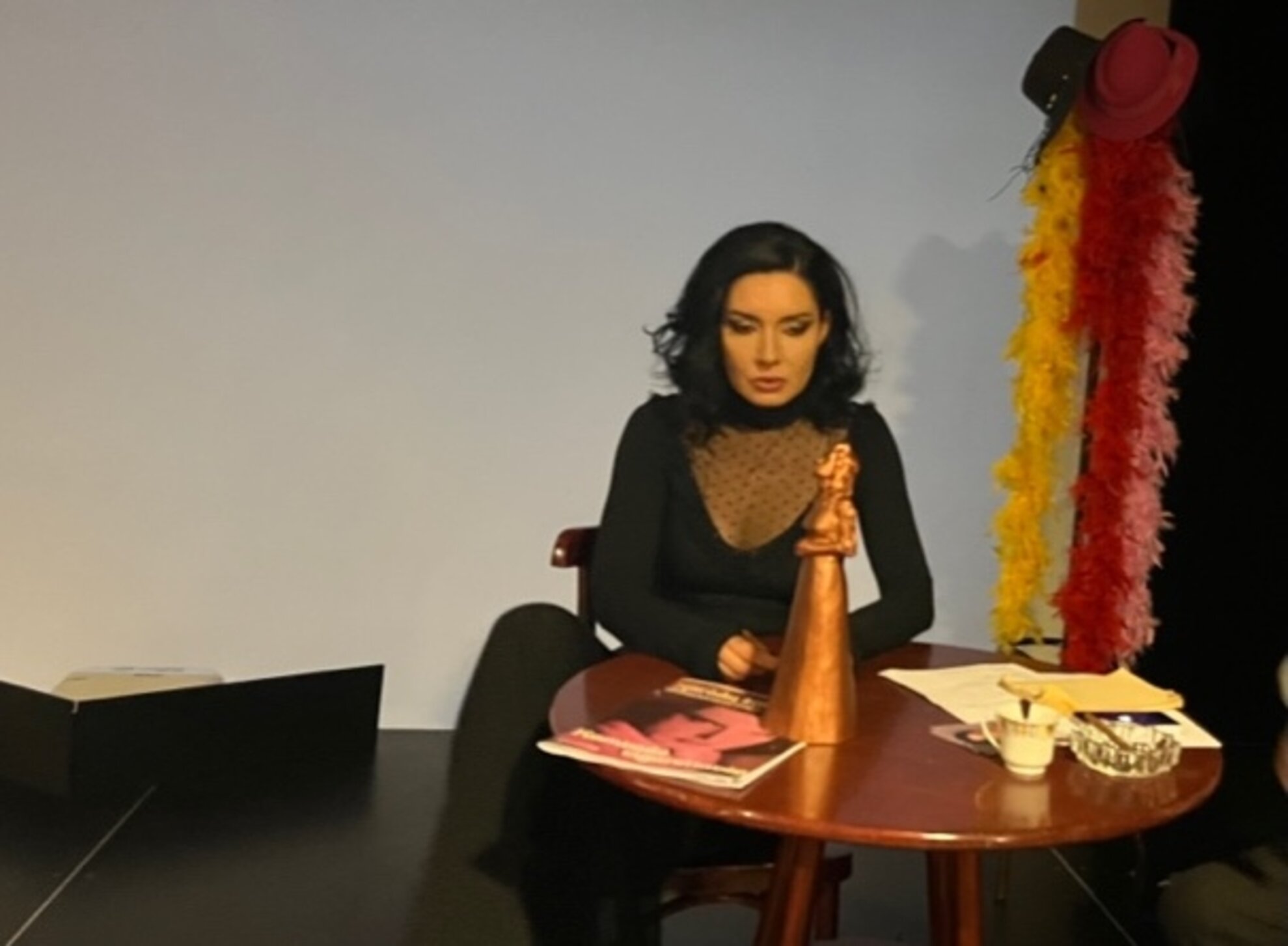In a small club in Budapest, tucked away off Király utca on the edge of the Jewish Quarter, Bernadett Gregor strides elegantly onto the stage. Alongside her, a lit cigarette slowly burns as a candle flickers. Behind her, a large screen awaits scattered footage of a tragic life spanning two world wars and the Atlantic Ocean, crossed once and once only, at least while the passenger was still alive.

Before Gregor awaits a multi-generational audience, its many young members born decades after the songs soon to follow wowed Hungary. For the next 70 minutes, Bernadett Gregor presents the life of Katalin Karády, ill-fated chanteuse, femme fatale and bitter exile.
Katalin Kanczler was born into abject poverty in Budapest in 1910. The exact place and date of birth are subject to debate but what we do know is that she was ruled over by aggressive, even violent, parents, then was taken in by a charity organisation.
“There are a thousand things said about her life and childhood,” Bernadett Gregor tells We Love Budapest after her performance. “When I prepared this show, I started to research about Karády’s life. It’s all up there now, on the internet, the quotes, what friends and colleagues said about her. That’s when I began to dive deeper into her life.”
The later-named Katalin Karády lived until 1990. By the age of 79, she had spent half of her life in exile. Gregor, the daughter of one Hungary’s most famous opera singers, portrays the key moments of her heroine on stage, introducing each of the many twists and turns with a song relevant to the mood. Accompanying her is a sole pianist, while behind, photographs and authentic footage show the passage of time, from a lowly upbringing to stardom and then demise.
Songlines
“Her old films were always shown on Sunday afternoons on TV when I was a girl,” explains Gregor. “They stayed with me. I chose the songs myself, linking them to certain parts of her life in a logical thread.”
The evening begins with Hiába menekülsz, hiába futsz (‘You Can’t Escape, You Can’t Run’), the song setting the tone for what’s to follow. “Fate,” sings Karády, “will always catch up with you”.
Spending five years in Switzerland and Holland, the young Katalin returned to Hungary a changed girl, but still needed to escape her family, marrying the first man she saw. Thirty years her senior, the faceless customs official vanished into history after their quick divorce.
Taking acting classes with little prospect of success, Katalin’s life changed when she walked into a bar. By chance, she crossed paths with the journalist, critic and would-be impresario Zoltán Egyed. As fate would equally have it, he had just bade farewell to Hollywood, and was currently heartbroken and worse, broke.
As Gregor elides into a perkier tune, so the budding actress becomes Katalin Karády, a name Egyed figures would light up the pages of the popular theatre magazines people devoured at the time. He also finds her a small part in a production at the National Theatre.
Alluring, mysterious, unobtainable, Karády has everything that Marlene Dietrich also embodies, with one huge asset: she’s Hungarian.
Who's that girl?
“It’s like she was so secret,” Gregor says now. “She was so suggestive. That’s why everyone wanted to know about her.”
Egyed feeds the myth, changes aspects of Karády’s past, influences other critics (“The stage sparkles when she speaks…”) and, pretty soon, Karády lands her first movie role.
Paired with the dashing Pál Jávor in a bizarre love triangle, Karády
becomes an overnight star in Halálos tavasz, 'Deadly Spring'. It was made in 1939.
Some 20 more films follow in quick succession. Her song, Hamvadó cigarettavég (‘Smouldering
Cigarette’), first performed in early 1942, captures her mood perfectly.
Women
copy her look, her manners, men swoon. One such is István Ujszászy, head of the
Secret Police for Miklós Horthy’s right-wing government. He not only falls in
love but proposes and buys Karády a villa in Buda, today the official residence
of the Irish ambassador. Framed photos and documents are displayed in the
lobby, an unusual conversation piece as guests are welcomed into the house.
Despite enormous intrigue at close quarters, Karády hides and helps Jewish families – selfless deeds that would later earn her, like nearly 1,000 of her equally brave compatriots, the status of Righteous among the Nations as later bestowed by the State of Israel.
She also sings for Hungarian troops on the Russian front, but all to no avail. When the Nazis invade Hungary in 1944, Karády’s songs are banned from the radio and she is quickly arrested for being a spy. Their actions stop production of her next film, aptly titled Gazdátlan asszony (‘Orphan Woman’).
Imprisoned, beaten and tortured, Karády is rescued close to death after
three months by associates of Ujszászy, whose fate is equally tenuous. Even
while weak and hungry, Karády still manages to save Jews from being shot by the
banks of the Danube, bartering with whatever pieces of gold and jewellery she
has left from her glory years.
She takes in children, seeing out the terrible
Siege of Budapest that winter. Then news comes from Moscow… Ujszászy is dead. The
singer takes to her bed for nine months and barely speaks.
It later emerges that the former spy may have still been alive, although
the ominous question mark next to his possible year of death, 1948, leaves
little room for doubt as to his condition. Zoltán Egyed, meanwhile, is dragged
off by Fascist Arrow Cross militiamen to Sopron, on the border with Austria.
His
camp later liberated by American troops, Egyed is flown home to Hungary,
ironically on the same plane as actor Pál Jávor. His career in ruins, he dies soon
afterwards, at the age of 53.
Karády, though alive, is shunned. Barely able to find roles on stage or screen, she is forced to play hick towns in the sticks before abusive, drunken audiences. As hard Communism becomes harder, she leaves Hungary in 1951, never to return.

It’s at this point in Gregor’s stage show that an anguished song about homesickness accompanies images of Karády’s life in São Paulo and then, New York. Running a hat shop, she would perform only rarely for special friends, refusing to appear in the media even when a softer, milder form of Socialism meant that so many Hungarian exiles made emotional homecomings from the 1970s onwards.
Her films shown on TV once more, her music available – “as teenagers, we would play her records all the time, even the lesser-known ones, we were just mad about her,” says Gregor, born in 1972 – Karády was also embraced by the gay community, attuned to her sensitivity.
To mark her 70th birthday, more than 30 years after she had last appeared before Hungarian public, Karády was invited back to her homeland. She refused and sent one of her hats instead. She died in New York in 1990. Her body was brought back to Budapest to be laid to rest in Farkasréti Cemetery beneath that flickering candle.
“I’m not the only one to have such a feverish curiosity in her,” says Gregor, beside a trophy presented to her after the show by the head of the local, active Katalin Karády Appreciation Society. “I didn’t want to play her on stage, not a straight impersonation. I just looked at her lyrics and read about her life. I honestly have no idea where this deep love of mine comes from I often visit her grave. I want a really good cry, that’s where I go.”
Gregor Bernadett performs Karády Katalin-Est in Budapest, at Lake Balaton and around Hungary. The show is given and sung in Hungarian. Keep a look out for dates and tickets at jegy.hu.



